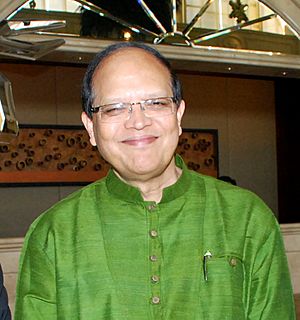Atiur Rahman facts for kids
Quick facts for kids
Atiur Rahman
|
|
|---|---|
|
আতিউর রহমান
|
|

Rahman in 2014
|
|
| Governor of Bangladesh Bank | |
| In office 1 May 2009 – 15 March 2016 |
|
| President | |
| Prime Minister | Sheikh Hasina |
| Preceded by | Salahuddin Ahmed |
| Succeeded by | Fazle Kabir |
| Personal details | |
| Born | 3 August 1951 Jamalpur, East Bengal, Pakistan |
| Spouse | Shahana Rahman |
| Alma mater | University of Dhaka SOAS, University of London |
| Profession | Economist |
| Awards | World No Tobacco Day Award (2012) Bangla Academy Literary Award (2016) |
Atiur Rahman (Bengali: আতিউর রহমান; born 3 August 1951) is a famous economist, writer, and banker from Bangladesh. He was the 10th Governor of Bangladesh Bank, which is like the main bank for Bangladesh. People sometimes call him "the banker of the poor" because he helped improve Bangladesh's economy.
Rahman made big changes in banking. He helped increase the country's money from other countries and brought in new technology to make banking easier. He resigned as the central bank governor on March 15, 2016, after a large amount of money was stolen from the Bangladesh Bank's account through a computer hack.
Contents
Early Life and Education
Rahman was born in a village in the Jamalpur District on December 13, 1951. His father was a farmer who did not go to school. Atiur Rahman had to stop school after third grade because his family needed money.
He was able to go back to school later. A teacher helped him get into Mirzapur Cadet College. The college let him study for free because his family couldn't afford it. He did very well in his exams there.
He then studied economics at the University of Dhaka. He later earned his Ph.D. from SOAS, University of London in 1977. His Ph.D. paper was later published as a book.
Career Highlights
In 1975, Rahman worked for the Bangladesh Parjatan Corporation, which deals with tourism. In 1994, he started a group called Unnayan Shamannay to help with development. He also worked at the Bangladesh Institute of Development Studies for almost 28 years.
He was a director at Sonali Bank, which is the biggest bank in Bangladesh. In 2001, he became the chairman of Janata Bank, the second-largest bank. In 2006, he became a professor at the University of Dhaka.
Rahman also worked with many groups that help people and culture. He focused on helping to reduce poverty. He did research to understand why people were poor and how to help them. He especially worked with people living in river shoals.
Leading the Central Bank
On April 29, 2009, Atiur Rahman became the 10th governor of Bangladesh Bank. He started his job on May 3, 2009, and was reappointed to serve until July 2016.
As governor, he started many programs to help the economy grow. These included loans for women who wanted to start businesses and loans for farmers who didn't own land. He also supported "green finance," which means investing in environmentally friendly projects.
Rahman brought in new technology to the banking system. He created the National Payment Switch, which made it easier to transfer money between banks. He also started mobile banking and set up systems for electronic money transfers. During his time, the amount of money Bangladesh had from other countries grew four times bigger.
In March 2016, Rahman resigned from his job. This happened after a large amount of money was stolen from the Bangladesh Bank through a computer hack. He said he would resign if it helped his country. Two days after resigning, he went back to teaching at the University of Dhaka. He was later honored as the 'Bangabandhu Professor' there. In 2019, he was appointed as a 'Bangabandhu Chair' at Dhaka University. He also leads Unnayan Shamannay.
Awards and Recognition
Atiur Rahman has received many awards for his work:
- Central Banker of the Year (2015) from the Asia-Pacific region. He got this award for helping farmers and small businesses get loans.
- Central Bank Governor (2015), Asia from The Emerging Markets Newspaper.
- The British Parliament praised him on March 8, 2015, for helping women become more independent.
- GUSI Peace Prize International (2014) for his work in economics that focused on helping poor people.
- World No Tobacco Day Award (2012) from the World Health Organization (WHO).
- Indira Gandhi Gold Plaque (2011).
- Atish Dipankar Gold Medal (2000).
- Chandrabati Gold Medal (2008).
- Nepal's Prime Minister thanked Rahman in 2015 for helping earthquake victims in Nepal.
- Dharitri Bangladesh National Award (2015).
- Bangla Academy Literary Award (2016).
- Bangabandhu Chair of the University of Dhaka (2019).
Personal Life
Atiur Rahman is married to Shahana Rahman. She is a professor who specializes in children's health at Bangabandhu Sheikh Mujib Medical University. They have three daughters.
See also
- List of Bangladeshi people
 | Frances Mary Albrier |
 | Whitney Young |
 | Muhammad Ali |

